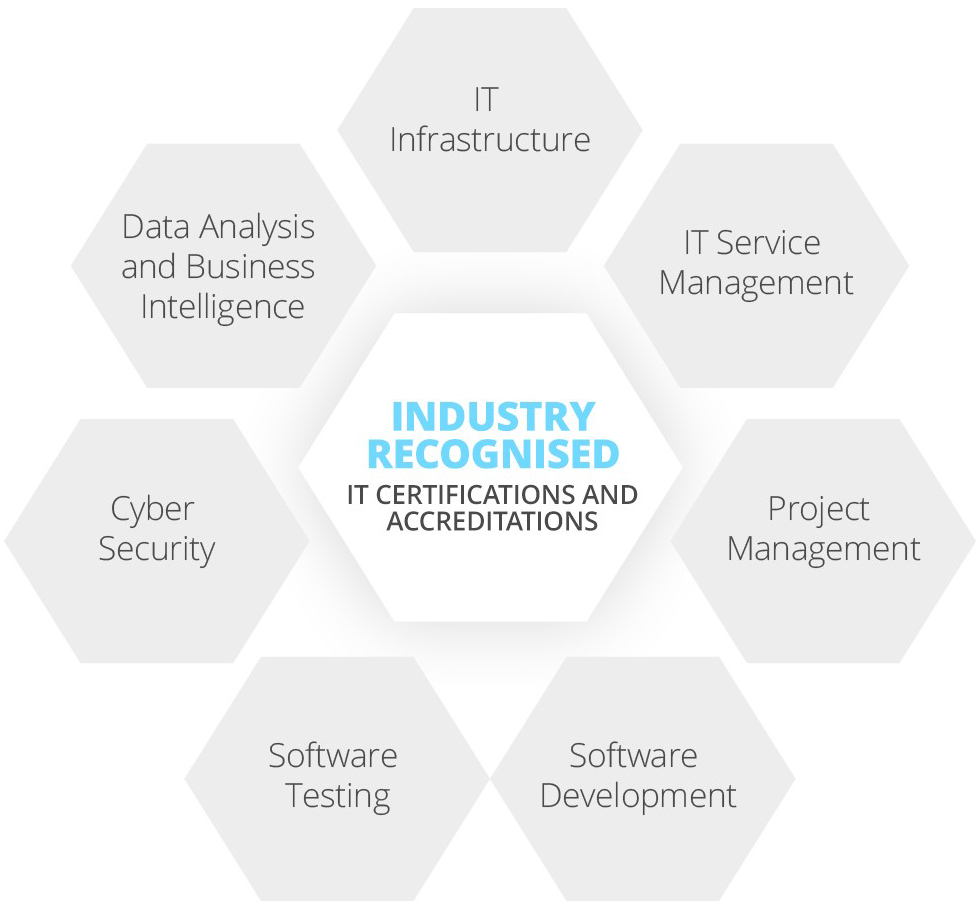IT Qualifications
IT Qualifications
As the demand for skilled IT specialists continues to grow, so does the importance of acquiring the necessary qualifications to thrive in this competitive field.
Information technology qualifications encompass a wide range of certifications, degrees, and specialised training programs that equip individuals with the knowledge and skills required to excel in various IT roles. IT qualifications validate expertise, provide individuals and IT contractors with a competitive edge in the job market and enhance their career prospects.
The breadth of IT qualifications is diverse and ever-changing. The listed qualifications fall into these main categories; IT and cloud infrastructure, IT service and project management, software testing, software development, cyber security and data analysis, focusing largely on vendor based professional qualifications.




IT Infrastructure
Most businesses rely heavily on robust IT infrastructure and cloud solutions to drive their operations.
IT infrastructure and cloud qualifications cover IT systems architecture, systems administration, storage management, disaster recovery, deployment models, security, and data management. These qualifications not only enhance career prospects but also contribute to the seamless functioning and digital transformation of organisations in an interconnected world.
IT Service Management
Effective management and delivery of IT services is critical for organisations to stay competitive. IT service management (ITSM) qualifications focus on equipping professionals with the skills and knowledge needed to design, implement, and improve IT service processes.
Qualifications encompass frameworks and methodologies such as ITIL (Information Technology Infrastructure Library) and ISO for delivering high-quality IT services. By pursuing ITSM qualifications, individuals demonstrate their ability to align IT services with business objectives, enhance customer satisfaction, and optimise IT service delivery.
Project Management
The successful execution of projects is vital for organisations to adapt, innovate, and thrive. IT project management qualifications focus on equipping professionals with the skills and knowledge needed to effectively plan, execute, and monitor IT projects.
These qualifications encompass methodologies such as PRINCE2 (Projects IN Controlled Environments) and Agile, including popular frameworks like Scrum and Kanban. By pursuing IT project management qualifications, individuals demonstrate their ability to lead project teams, manage resources, and adapt to changing requirements through iterative and collaborative approaches.
Software Development
Software development lies at the heart of technological innovation, powering the creation of applications, systems, and solutions that drive businesses and improve our daily lives.
By pursuing software development qualifications, individuals will gain the necessary skills and knowledge to design, build, and maintain software products. These qualifications encompass various programming languages, development methodologies, software engineering principles, and best practices.
Software programming and development qualifications validate the skills required for coding, problem solving and delivery of high quality software solutions.
Software Testing
Software testing plays a critical role in ensuring high quality, reliability, and performance of software applications.
Software testing qualifications cover a range of methodologies, techniques, and tools, enabling professionals to design comprehensive test plans, execute test cases, and report and analyse software defects.
By obtaining software qualifications, individuals demonstrate their proficiency in identifying and rectifying software issues, improving user experience, and contributing to the overall success of software development projects.
Cyber Security
Cyber security is critical for individuals and organisations to help reduce the risk of cyber-attack. The core function is to protect devices and services from unauthorised access to stored personal information, and is ever increasing in both need and complexity, creating a permanent need for ongoing training.
Data Analysis and Business Intelligence
Business intelligence describes the strategies, technologies, and tools that companies use to obtain business information. It also describes the information itself. Data analytics is the technical process through which we obtain actionable insights from raw data.
Both terms are used interchangeably, with business intelligence being the generalised term that encompasses analytics, but there are distinctions.
The major difference between business intelligence and data analytics is that analytics is geared more toward future predictions and trends, while BI helps people make decisions based on past data.
Latest IT Jobs
Software Developer – AWS, Python, React & Node.JS
This is a newly created position for a Full Stack Developer to take an instrumental role in a Northampton-based firm, offering a hybrid work environment (circa 3 days in the office) and a salary of £ 50,000- £ 60,000. The ideal candidate will have solid hands-on skills across a full development stack. To be...
Read moreLead Software Developer – React, Node.JS, AWS & Python
This is a newly created position for a Lead Software Developer to take a newly created position with a Northampton based firm paying £75,000 – £85,000 + up to 15% bonus in a hybrid work environment. This is both a hands-on technical and leadership role, responsible not only for building high-quality, scalable systems but...
Read moreInformation Security Manager
A multinational Software and Services firm is looking for an accomplished Information Security Manager to join its team. Please note the firm embraces flexibility so you will be able to work from home 2-3 days per week. In order to be suitable for this role you must be an accomplished Information Security Manager with an expert understanding of ISO...
Read moreIT Salary Guide
With the well documented shortage of IT skills putting pressure on businesses across the UK, demand for Information Technology skills is at an all-time high.
Stay informed with the very latest IT salary data to maintain and attract key talent. Explore salaries for IT roles in your region.